Filter by

Organizational Behavior
This OpenStax resource aligns to introductory courses in Organizational Behavior. The text presents the theory, concepts, and applications with particular emphasis on the impact that individuals and groups can have on organizational performance and culture. An array of recurring features engages students in entrepreneurial thinking, managing change, using tools/technology, and responsible manag…
- Edition
- -
- ISBN/ISSN
- 9781947172722
- Collation
- -
- Series Title
- -
- Call Number
- 650
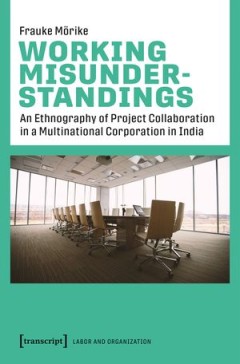
Working Misunderstandings
Misunderstandings are often perceived as something to be avoided yet delineate an integrative part of everyday work. This book addresses the role that misunderstandings play in collaborative work and, above all, their effects on the organisational result. As exemplified by project collaboration across three offices of a multinational corporation in India, Frauke Mörike explores how misundersta…
- Edition
- -
- ISBN/ISSN
- 9783839458679
- Collation
- -
- Series Title
- -
- Call Number
- 650

What Will Be Already Exists : Temporalities of Cold War Archives in East-Cent…
How do artist archives survive and stay authentic in radically changed contexts? The volume addresses the challenge of continuity, sustainability, and institutionalization of archives established by Eastern European artists. At its center stands the 40th anniversary of the Artpool Art Research Center founded in 1979 in Budapest as an underground institution based on György Galántai's »Active…
- Edition
- -
- ISBN/ISSN
- -
- Collation
- -
- Series Title
- -
- Call Number
- 650
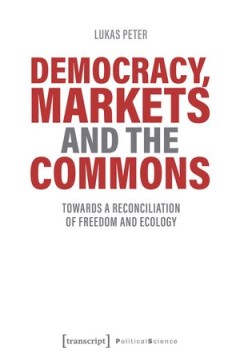
Democracy, Markets and the Commons : Towards a Reconciliation of Freedom and …
How can we overcome the existing political, economic, and ecological crises that humanity faces? With the notion of the commons, Lukas Peter argues that this form of social organization can provide answers to the shortcomings of centralized states and open and competitive markets. By building on and going beyond the work of Elinor and Vincent Ostrom, he develops an ecological understanding of t…
- Edition
- -
- ISBN/ISSN
- 9783839454244
- Collation
- -
- Series Title
- -
- Call Number
- 650
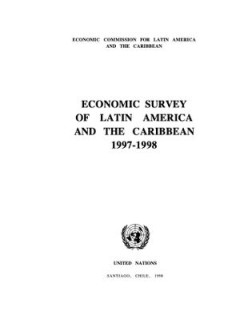
Economic Survey of Latin America and the Caribbean 1997-1998
The Economic Survey of Latin America and the Caribbean, 1997-1998 is the fiftieth edition in this series. To mark this milestone, a special chapter has been included in this edition which traces the history of the publication and outlines the way in which the economic situation in the region has been viewed during each of the periods examined. Once again, the Survey has been published as a sing…
- Edition
- -
- ISBN/ISSN
- -
- Collation
- -
- Series Title
- -
- Call Number
- 650

Economic Survey of Latin America and the Caribbean 1997-1998
The Economic Survey of Latin America and the Caribbean, 1997-1998 is the fiftieth edition in this series. To mark this milestone, a special chapter has been included in this edition which traces the history of the publication and outlines the way in which the economic situation in the region has been viewed during each of the periods examined. Once again, the Survey has been published as a sing…
- Edition
- -
- ISBN/ISSN
- 9789210582971
- Collation
- -
- Series Title
- -
- Call Number
- 650
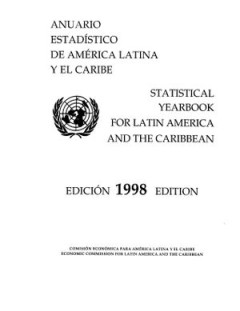
Anuario Estadístico de América Latina y el Caribe 1998 = Statistical Yearbo…
The 1998 edition of the Statistical Yearbook for Latin America and the Caribbean contains a selection, updated to the end of December, of the main statistical series available on economic and social trends in the countries of the region. It represents a systematic effort of the ECLAC Statistics and Projections Division to harmonize the figures and make them internationally comparable. The year'…
- Edition
- -
- ISBN/ISSN
- -
- Collation
- -
- Series Title
- -
- Call Number
- 650
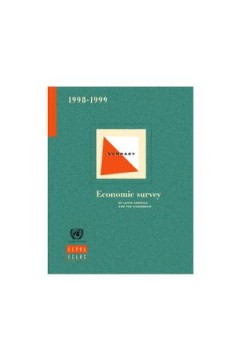
Economic Survey of Latin America and The Caribbean 1998-1999
This summary provides an assessment of the Latin America and the Caribbean region's economy during 1998 and the first half of 1999. It presents an overview of each country's external sector, macroeconomic policy, activity levels, inflation, employment, saving and investment. The publication contains thirteen statistical tables
- Edition
- -
- ISBN/ISSN
- -
- Collation
- -
- Series Title
- -
- Call Number
- 650
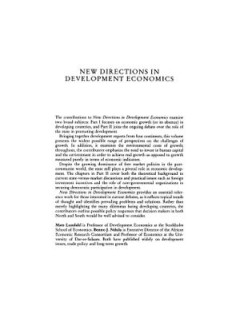
New Directions in Development Economics
New Directions in Development Economics is divided into two parts. The first half considers the dilemna of growth with special reference to its environmental cost. The second half focuses on the role of the state in the context of the growing dominance of the free market argument. The contributors include Paul Collier, Partha Dasgupta, Ronald Findlay and Deepak Lal.
- Edition
- -
- ISBN/ISSN
- -
- Collation
- -
- Series Title
- -
- Call Number
- 650
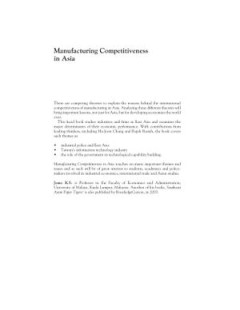
Manufacturing Competitiveness in Asia
There are competing theories to explain the reasons behind the international competitiveness of manufacturing in Asia. Analysing these different theories will bring important lessons, not just for Asia, but for developing economies the world over. This lucid book studies industries and firms in East Asia and examines the major determinants of their economic performance. With contributions from …
- Edition
- -
- ISBN/ISSN
- -
- Collation
- -
- Series Title
- -
- Call Number
- 650
 Computer Science, Information & General Works
Computer Science, Information & General Works  Philosophy & Psychology
Philosophy & Psychology  Religion
Religion  Social Sciences
Social Sciences  Language
Language  Pure Science
Pure Science  Applied Sciences
Applied Sciences  Art & Recreation
Art & Recreation  Literature
Literature  History & Geography
History & Geography